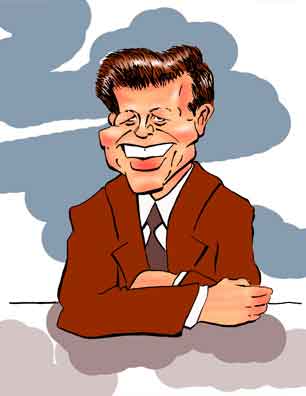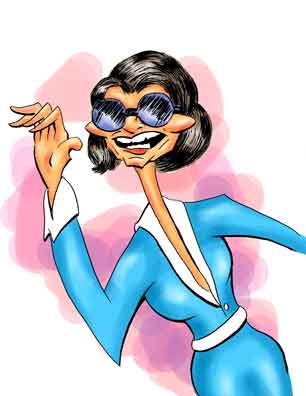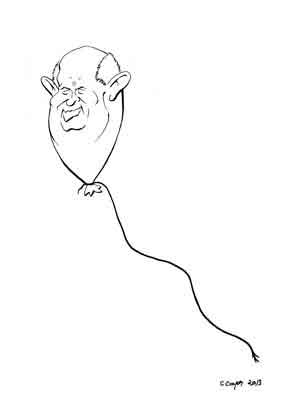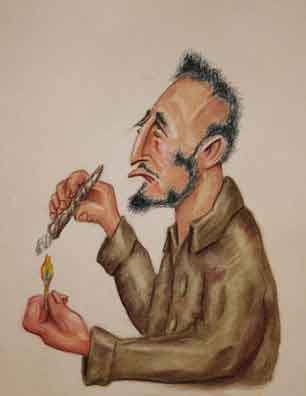El Hombre Misterioso
(And a Totally Irrelevant Discussion)

El Hombre Misterioso
Of course, all but the most dense know that Grover Cleveland was elected the 22nd president in 1884 and then lost the next election to Benjamin Harrison. But Grover then returned as the 24th president in 1893. Because Grover's re-election did not immediately follow his first, his time in office is considered to be divvied into two separate terms. So John Fitzgerald Kennedy was the 35th president, but the 34th man to take the oath. Some find this way of counting presidents a bit inconsistent, but that's the way it goes.
Although the following may be irrelevant regarding the drawing, JFK was the first celebrity president whose public persona was, shall we say, a bit off balance from the holistic picture. Not the first president whose public persona was off, mind you, the first celebrity president. After all, John Fitzgerald Kennedy was the first celebrity president, period.
Honesty compels us to admit in the last fifty-odd years there has been a wee bit of tarnishing of the Camelot glitter, and hindsight has shown us that on both the personal and professional level JFK made a few ill-advised decisions. Still, he continues to rise far above the presidential herd in popular opinion and a recent Gallup poll had Americans rating Jack as #1 above all other US presidents - yes higher than Washington, Lincoln, and FDR. That, we should point out, is a recent appraisal. But even if you look at the ratings taking during their presidential terms, Jack still hits a whopping 70% average approval which is either #1 or #2 depending on how the pollsters juggle the data.
Jack's consistently high standing even after half a century of tabloid revelations is a pretty good confirmation of the Official CooperToons Theory that the historical evaluation of a president is not based on how good or bad he was in any absolute terms. Not that we're saying JFK was a bad president, but when push comes to shove, a president's ultimate legacy has been decided simply by his popularity. Only modest reflection shows this is indeed the case. Of course, we don't necessarily mean the "academic" ratings by tenured eggheads. After all, a number of professors rate Calvin Coolidge near the bottom of the presidents along with Millard Fillmore, Franklin Pierce, and Warren Harding. But when was the last time you heard a friend declaim "Well, if it wasn't for Coolidge we wouldn't be in this fix!" And can anyone picture a candidate saying, "I knew James K. Polk. James K. Polk was a friend of mine. And you, Mr. Taylor, are no James K. Polk."
Being the first celebrity president was made easier because Jack was young and debonair (to use a rather outdated term), and he lived in the era where politicians were relatively free to do what they wanted in their - ah - "off hours". Of all the presidents, Jack was by far the most photogenic, a happy characteristic which fit in perfectly with communication technology of the time. This was, after all, the era when magazines had finally mastered the trick of cheaply reproducing full color photographs instead of relying on fuzzy black and white prints and photoengraved artwork. So almost from the first we were inundated with great pictures of Jack and his family - Jackie, Caroline, and John, Jr. - being America's First Family.

Jackie - America's First Mom
Of course, having high placed members of the press as personal friends helped. Jack was on very cordial terms with Ben Bradlee, then the Washington Bureau Chief for Newsweek Magazine and later managing editor of the Washington Post during the Watergate years. Ben and Jack had been friends and neighbors in Georgetown back in Jack's senatorial days, and much of Ben's success as a journalist was his being a classic "Washington Insider". He not only knew politicians like Jack but also he had friends in the military and, yes, the CIA. In fact, Ben had been friends since boyhood with the CIA man and later chief, Richard Helms.
Although Ben claimed he was not privy to many of Jack's (wink, wink) secrets (which is a claim many find hard to buy), it's highly doubtful he would have reported them even if he had. But in the early 1960's, Ben - and most other newspapermen - saw such information as "family matters", and when he learned later (during the early Johnson administration) that a particularly juicy - ah - "family matter" was true - a tidbit that would today be instantly splashed over the headlines - he kept mum for years.
But you didn't need to be a personal friend of Jack to write glowing articles. Almost from day one there was a continuous stream of articles in Life Magazine that could hardly have been better crafted by the most high paid Hollywood publicists. Life was then the most popular magazine in the US with issues being published every week. Yes, that's every week. Not every month. Not every two months. Every week.
Starting with the first issue after Jack took office, Life blared out that with Jack at the helm the nation had -
A NEW HAND!
A NEW VOICE!
A NEW VERVE!
and trumpeted that Jack's inaugural address was
A GREAT SPEECH!
and had the celebratory pictures of the after-ceremony soirée. We saw Jack smiling with the out-going Ike, the new Vice President LBJ chatting with Jackie, and ex-President Harry Truman giving Jack his autograph. This article was quickly followed up by a plethora of stories which showed Jack was a president always in charge, thinking quickly, and who could read 1200 words a minute. Here was a man who despite all the pressures still could attend the opera and have time to walk with his kids at the White House. And one of the early books on Jack's life tells us how when Jackie and the kids were away, he might call one of his buddies to come over just to chat. They'd eat dinner, watch television, and along about 11, Jack would get into his pajamas. Then with his friend at his side - and this is what the book said - he would say his prayers and get into bed. His friend would turn out the light and go on home. A typical night, we hear, for JFK.
Well, by now there's been enough written and corroborated to know that Jack did indeed have friends over when he was on his own. And who knows? Maybe they did turn out the lights.
Ironically, it was Jack's wholesome family-man public image that set him up for the comedians who were using the relatively new medium of network television (then only ten years old) and the recording industry (more venerable). Of course, Jack was not the first president to be satirized, nor was he the first to be the butt of a presidential comedic impressionist. No, probably that was FDR. But Jack was certainly the first president when the comedians started making an industry of the art. When The First Family album was released in 1962 with Vaughn Meader as Jack, it was an immediate best seller with over 7,000,000 copies sold, and it won a Grammy for Best Album of the Year. A paperback book with some of the skits was later released which used photos of the real people that fit with the script rather than pictures of the actors.
Vaughn later performed some of the skits in night clubs and on television, including the popular Ed Sullivan Show which at the time marked the pinnacle of show-biz success. Of course, nothing gets dated quicker than political satire, and today many of the jokes will be obscure or even unintelligible. But at the time, the album struck the nation's funnybone and laid the foundation for the explosion of other presidential and political impressionists that continues to this day.
Most of the spoofing of the Kennedys was good-natured ribbing devoid of the mean-spirited (but often very funny) jabs that today are totally de rigeur. But after November 22, 1963, all satires about JFK were voluntarily yanked from the shelves. Mad Magazine even changed the cover of their compilation The Mad Frontier from Alfred E. Neuman sitting in a rocking chair - a reference to the rocking chair Jack used to ease his bad back - to Alfred in a covered wagon. Happily, the best MAD satires about JFK were reprinted in Mad About the Sixties in 1995.
Nowadays it's hard to tell if more people have seen the movies and doubly misnamed docudramas about Jack than have read the non-electronic devices with white flappy things in the middle. Even in the olden days, kids learned much of their basic history from watching the small and wide screen. After all, in the 1950's most kids learned who Davy Crockett was because they watched the famous television show with Fess Parker, not because they read Davy's autobiography, the Narrative of the Life of David Crockett of the State of Tennessee Written by Himself. If you do read Davy's book, you'll learn that he once worked for a farmer named - get this - John Kennedy.
Although we can't be too self-critical because we learn a lot of history from television, movies, and (now) the Fount of All Knowledge, caution is needed. In movies and in - quote - docu - unquote - quote - dramas - unquote, despite how much the writers swear it is the TRUTH, many of the specific scenes and dialogue are invented. True, we have to realize that writers need liberties in making the book-to-film transition. After all, if you don't know what was actually said, you have to make it up. And in compressing the action from weeks, months, or years, into hours, you have to well, compress weeks, months, and years into hours.
But in even the best docudramas or biopics (including the excellent and accurate film Wilde staring Stephen Fry) what we see is not verbatim history. To maximize accuracy, historical films draw the dialog from diaries, transcripts, letters, and telegrams. On the other hand, to hold the audience's interest, the scriptwriters have the actors either speaking or shouting at each other. If you think movies are bad now - made up of massive back-and-forth closeups where the characters swap one-liners with not a single nose hair or pimple omitted, think what the movie would be like if it was composed of alternating closeups of the actors reading their mail. And sometimes (such as in the lamentable but nonetheless entertaining Houdini starring Tony Curtis and Janet Leigh) what you see is so far from the mark that it's debatable whether the writers should even be using the real names of the characters.
Probably the best mark of JFK's unprecedented popularity was in the summer of 1963. Warner Brothers released PT-109 starring Cliff Robertson, known to more recent audiences as Uncle Ben of Toby McGuire in Spiderman. Cliff made no attempt to alter his voice or mannerisms to fit those of JFK, putting the onus on the audience to suspend disbelief. At the time no one seemed to mind, least of all Jack and the other Kennedys. Today a movie about the heroic exploits of a current president would probably receive scorn and ridicule - or perhaps an Academy Award for Best Unintentional Comedy.
Oddly enough, times were toughest for scriptwriters - and actors - when dealing with the Kennedys in the years immediately following Jack's death. Then people expected the actors to at least have some resemblance to the brothers. When the made-for-TV movie, The Missiles of October, was broadcast in 1974, William Devane played JFK and a 34-year-old Martin Sheen (yes, Martin Sheen), played his brother, Attorney General Robert F. Kennedy (Robert's middle initial, by the way, stood for "Francis"). With the Kennedy image still in the minds of the public, the make-up artists did their best to mold William and Martin into the two brothers, complete with the tousled Kennedy hair. It certainly helped that William had some natural resemblance to John, particularly around the eyes and with the slightly poochy lower lip. So critics were able to report that even if the actors didn't really look that much like J-and-RFK, at least they had given it the old Kennedy try.
Both William and Martin also put on their best Boston-Brahmin cosmopolitan accents and upped their pitch accordingly as neither of the Kennedys could have taken on the Wagnerian role of Wotan. But since today you never see any film unless it's in color, the memory of the distinctive Kennedy timbres continues to fade. In the most recent wide screen depiction of the Brothers Kennedy - a movie whose title we will not name - "Jack" spoke with a baritone robustness and more than a tang of the Midwest.
We don't want to leave the impression that Jack was totally a creation of a friendly media and Hollywood, nor that he could not make exemplary decisions. You have to be, well, "mature", to have a first hand memory of the Cuban Missile Crisis. As we all know now, on October 22, 1962, JFK made a speech on television announcing that there were Russian nuclear missiles in Cuba. Naturally he did not mention what specific action would be taken, but American troops were already being mobilized and getting ready to invade. Of course this information was kept close to the vest, but it was let slip by a Congressional leader during an informal conversation in one of the more out-of-the-way Congressional districts. But when a local newspaper editor later sidled up to the Congressman and asked if he had understood the comments "the troops are mobilized and ready to invade" to mean that the troops were mobilized and ready to invade, the Congressman spluttered, "Don't quote me! Don't quote me!" He was not, and the word was kept mum.

Nikita's Trial Balloon
Later information - which became available after the fall of the Soviet Union - revealed that a US invasion could have been disastrous for everyone. The Soviets did have long range strategic nuclear missiles pointed at US cities, yes. But they also had tactical battlefield nuclear weapons which were intended to fire, not at American cities, but at an invading force. And the authority to use the tactical weapons remained with the Russian officers in Cuba without verification from Moscow.
Would the tactical weapons have been used? Who knows? But it was a real possibility.
Ultimately, after Nikita Khrushchev and his buddies floated out a couple of trial balloons, the famous deal was worked out. The US would announce they would not invade Cuba, and the Russians would remove the missiles. But as the Russians had pointed out that Soviet missiles in Cuba pointing at Washington was scarcely different than the US missiles in Turkey pointing at Moscow, a tit-for-tat removal was also thrown in. But the Americans didn't want that written into the deal as that would make them look like we were softies. Knowing that American politicians had pressures the Russian officials didn't have (like getting elected), Nikita agreed to a non-written gentleman's agreement.
The Cuban Missile Crisis has been inevitably written as a great triumph for JFK. If so, it was equally a triumph for the Russians and the Cubans. Ever since April 17, 1961 when a group of 1500 US-backed soldiers (mostly Cuban exiles) landed at Cuba's Bahía de Cochinos to set up a counter-revolutionary army to oust Fidel, the Cubans had been expecting a serious US invasion. But with the agreement, the threat of an invasion was removed, and Fidel, who had actually argued for a preemptive nuclear strike against America, remained in power until his voluntary retirement in 2008.
Alas, Nikita did not fare so well. The negative aspects of the Crisis (plus Nikita's sometimes embarrassing speeches and behavior) led to Nikita's own fall from power on the last day of the World Series in 1964. But things had certainly changed. Ten years earlier and Nikita would have found himself (temporarily) in the basement of Lubyanka Prison. Instead, he was given an apartment, a country dacha, and a pension. He lived until 1971 and even managed to smuggle his memoirs to the United States.

Fidel
He remained in power.
Not everyone saw a negotiated settlement as the best of all worlds. There had been some in the administration - who shall be unnamed but were unknowingly recorded by JFK's hidden microphones - who strongly pushed for immediate invasion. This, as they said when JFK was out of the room, was doing it "right". JFK didn't agree, and he was, after all, the boss.
As an aside, it's instructive to compare the actual recordings made during the crisis - the restrained and quiet manner of speaking - to the Hollywood depictions on both the small and wide screen - where the actors indulge in spittle-flinging and expletive filled shouting matches. Hollywood, of course, likes to make things - quote - "dramatic" - unquote - and sometimes reality is just too boring. A similar problem was encountered by the producers and writers of the recent movie about the Kon-Tiki Expedition. The movie shows Thor Heyerdahl and Herman Watzinger - the #2 man of the expedition - at major odds on important issues. The reality was that the two men got on so well that the scriptwriters had to invent some strife since they thought the movie would be too dull otherwise. When getting your history from television or movies, Caveat Visor!
In addition to JFK ultimately making the right calls on Cuba, he did something notable that did not set precedence. Because Jack had an adequate income from other means - to put it mildly - he donated his entire salary as a senator and as president to charity.
Compare this to our current group of elected officials, many of whom have tens of millions of dollars in personal assets along with their no-deductible health care and inflation-adjusted retirement pensions, all provided at taxpayer's expense. Not too long ago all lower federal level civil servants had their income cut off due to congressional bumbling coupled with a heavy dose of inexcusable political partisanship. So some of the Congressmen and Senators wondered if it would look just a wee bit better if they temporarily donated their salaries - at least for a little while. Don't think any of them did.
That leaves only one thing we should tell our own representatives.
"You're no Jack Kennedy."
References and Further Reading
An Unfinished Life: John F. Kennedy, Robert Dallek, Little, Brown and Company, 2003
President Kennedy: Profile of Power, Richard Reeves, Simon and Schuster, 1993
Johnny, We Hardly Knew Ye, Kenneth O'Donnell and David Powers, Little, Brown and Company, 1972.
JFK: In His Time and Ours, the Atlantic, Fall, 2013.
The Dark Side of Camelot, Seymour Hersh, Little, Brown and Company, 1997. In a lecture, Sy once commented that if just a few of the things he writes are correct, then much of what the historians and other journalists tell us about JFK is wrong. Don't know if this is a recommendation for the book or self-criticism.
"Americans Rate JFK as Top Modern President", http://www.gallup.com/poll/165902/americans-rate-jfk-top-modern-president.aspx
"The Closest Look Yet at J. F. K: Pictures Inside the White House Show Tenseness Behind Relaxed Air", Paul Shutzer (Photographer), Life Magazine, pp. 35-40, April 28, 1962. Only one of many first hand articles about Jack written between 1961 and 1963.
"Life Goes Courting with a US Senator,", Life Magazine, pp. 96-99, July 20, 1953. The first of the Jack and Jackie articles as beautiful people. It's an interesting issue since it also has an article by an acquaintance of the recently deposed leader of the Soviet Secret Police, Laventia Beria. All issues of Life Magazine are on-line at https://books.google.com/books/about/LIFE.html?id=N0EEAAAAMBAJ.
John F. Kennedy Presidential Library and Museum, http://www.jfklibrary.org/.
"The Cuban Missile Crisis", The National Security Archvies, The George Washington University, http://nsarchive.gwu.edu/nsa/cuba_mis_cri/audio.htm. Some of the recordings made during the Cuban Missile Crisis.
"A Mannah of Speaking", Patrick Healey, the New York Times, September 2, 2009. Today it's particularly fashionable on the Fount of All Knowledge to claim the Kennedys did not really speak with a Boston accent - or not an upper-crust accent. Instead we read it was concocted and fabricated. Some native Bostonians will say they never heard anyone talk like the Kennedys.
Well, for forty years or more, no one - whether they hailed from Beacon Hill or Rattan, Oklahoma - claimed the Kennedy's vernacular as being 1) invented or 2) non-Bostonian. And truth to tell, regional speakers are probably not the best to ask regarding identifying their local speech inflections in their community. Many people with the thickest regional accents will fly into spittle flinging diatribes if you suggest they speak anything except - quote - "Standard English" - unquote.
"The Presidential Rankings Game: Critical Review and Some New Discoveries," Curt Nichols, Presidential Studies Quarterly, Vol. 42(2), pp. 275-299, 2012.
"Presidential Job Approval", http://www.presidency.ucsb.edu/data/popularity.php?pres=43&sort=time&direct=DESC&Submit=DISPLAY. Jack's 70% average ranking did not mean he had the highest ranking ever achieved at any time. The big surprise is this accolade went to Harry Truman who achieved 91% approval in his first 3 months as president - only to descend to 22% approval six years later - the lowest ranking since approval polls have been taken. The concept of variability is difficult for most people to grasp and such swings have to be considered in determining presidential popularity.
A Narrative of the Life of David Crockett Written by Himself, David Crockett, Carey and Hart, Philadelphia, 1834.
Conversations with XXXXXX, ca. 1985, a first-hand CooperToons reference.
Return to John Fitzgerald Kennedy Caricature